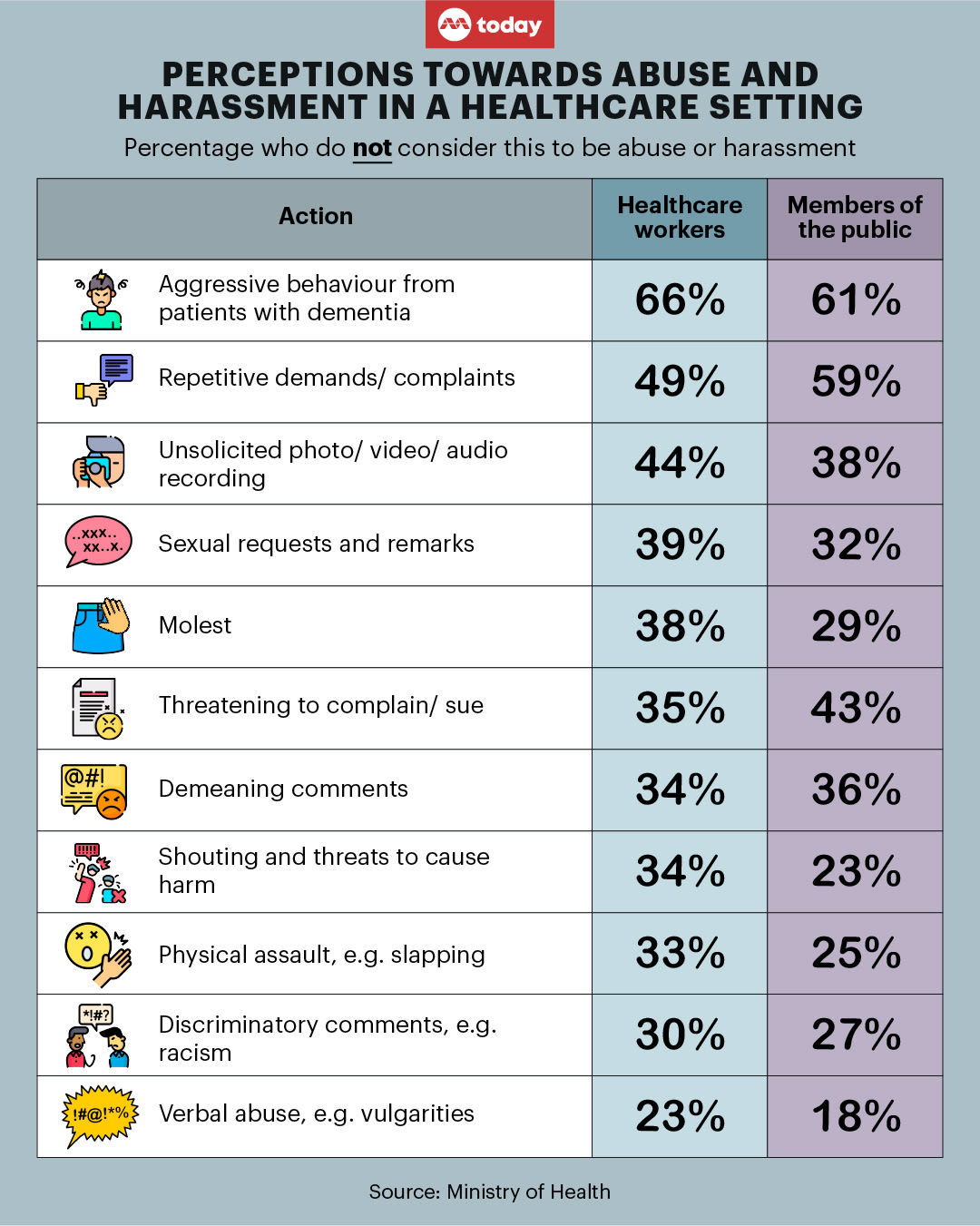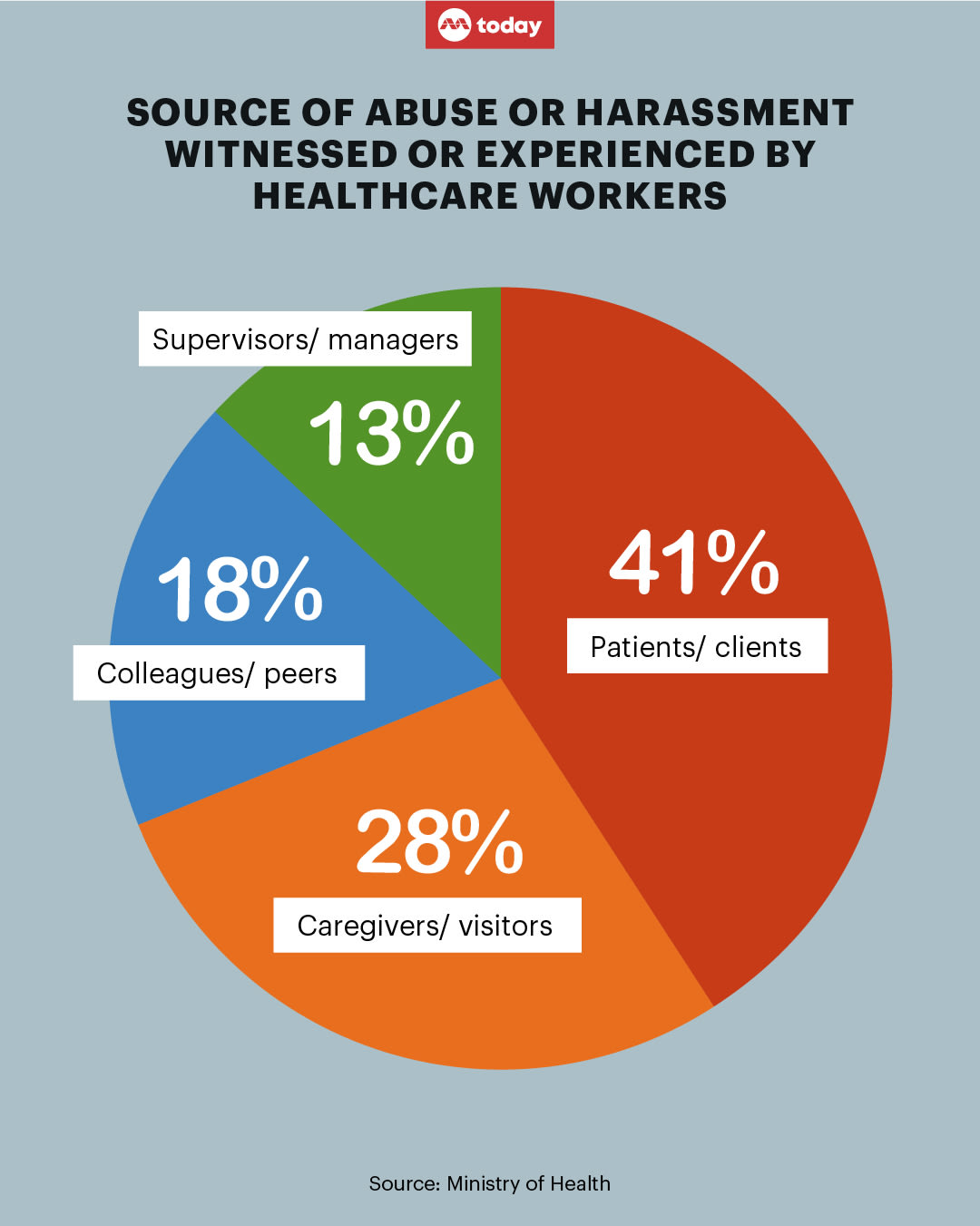Study finds 4 in 10 healthcare workers dismiss molest and sexual requests as abuse, 'rationalising' these as part of job
SINGAPORE — About four in 10 healthcare workers do not consider being molested at work a form of abuse, while a significant proportion of these workers also feel the same way about physical assault and people uttering vulgarities or making discriminatory comments towards them.

- About four in 10 healthcare workers did not consider being molested on the job a form of abuse, a study found
- A significant proportion of healthcare workers had normalised or rationalised abuse which included shouting, physical assault and other forms of demeaning behaviour while working as being part of their job
- The study by a tripartite group flagged xenophobia and mismatched expectations among patients, their caregivers and healthcare workers as some root causes of abuse
SINGAPORE — About four in 10 healthcare workers do not consider being molested at work a form of abuse, while a significant proportion of these workers also feel the same way about physical assault and people uttering vulgarities or making discriminatory comments towards them.
These were findings from a recently released study, which also found that workers had, to some extent, normalised and rationalised such abuse and harassment as "being part of their jobs".
The study, published on Friday (March 17), was done by a tripartite workgroup comprising representatives from the Ministry of Health (MOH), the public healthcare clusters, community care partners, private healthcare providers and the Healthcare Services Employees' Union.
It was formed last April to lead a national effort to prevent the abuse and harassment of healthcare workers in the public, private and community sectors.
One other finding from its study was that a third of all healthcare workers had seen or experienced abuse or harassment at least once a week, with frontline healthcare workers such as pharmacists or nurses more likely to experience such abuse.
For example, more than half (55 per cent) of pharmacists had seen or experienced abuse or harassment at least once a week.
This may be because pharmacists are often the last point of contact with patients or next-of-kin before they are discharged from hospital wards or specialist outpatient clinics.
On average, healthcare workers reported that the abuse or harassment they had witnessed or experienced came from:
- Patients (41 per cent)
- Patients’ caregivers or visitors (28 per cent)
- Colleagues or peers (18 per cent)
- Supervisors or managers (13 per cent)
The workgroup engaged more than 3,000 healthcare workers and more than 1,500 members of the public through surveys and focus-group discussions in the second half of last year for this research.
Speaking at an engagement session with National Healthcare Group employees on Friday, Health Minister Ong Ye Kung said that such abusive behaviour is unfair to healthcare workers whose profession is centred around care.
"It is also unfair to the majority of the members of the public who are understanding and respectful to healthcare workers, because then, a disproportionate amount of time is always spent on handling the few abuse cases at the expense of those who are appreciative and understanding," he added.
THE KEY FINDINGS
1. The study found that abuse and harassment was prevalent across all healthcare settings.
- More than two in three healthcare workers said that they had witnessed, or personally experienced, abuse or harassment in the past year
- A third of all healthcare workers witnessed, or personally experienced, abuse or harassment at least once a week
2. MOH said in a press release on Friday that frontline healthcare workers such as pharmacists, patient service associates and nurses were also more likely to experience abuse and harassment.
3. The most common forms of such abuse were:
- Shouting
- Demeaning comments
- Threats by patients and caregivers to file complaints or take legal action against healthcare workers
4. Physical assault was less commonly reported: Four per cent of healthcare workers said that they had witnessed or experienced physical assault in the last year, compared to 46 per cent who said that people shouted at them or had seen such incidents.

WHAT THEY DID NOT SEE AS ABUSE
The survey found that many healthcare workers did not consider certain actions as abuse or harassment.
- About one in three healthcare workers did not consider physical assault, vulgar or discriminatory comments as abuse or harassment, with a lower proportion of the public thinking the same way
- Close to 40 per cent of healthcare workers and about 30 per cent of the public did not consider molest, sexual requests and remarks to be abuse or harassment. The survey did not provide examples of such requests and remarks
- About four in 10 healthcare workers (44 per cent) and members of the public (38 per cent) did not consider unsolicited photos, videos or audio recordings to be abuse or harassment
- About three in five healthcare workers (66 per cent) and members of the public (61 per cent) did not consider aggressive behaviour from dementia patients as abuse or harassment
- About half of the healthcare workers (49 per cent) and three in five of members of the public (59 per cent) did not consider repetitive demands or complaints to be abuse or harassment
The workgroup noted that “a significant portion” of healthcare workers had discounted the actions listed above as not abusive.
“This suggests that to some extent, healthcare workers have normalised the abuse and harassment that they experience and have rationalised these as being part of their job,” it added.
Focus-group discussions also revealed that some members of the public felt that certain behaviours should not be deemed as abuse or harassment if healthcare workers had the autonomy to reject or ignore invasive or abusive requests such as sexual propositions.
THE ROOT CAUSES OF ABUSE
The workgroup flagged several reasons for abuse and harassment from patients and their caregivers.
One root cause was xenophobia, such as when demeaning comments were made to healthcare workers on the basis of their nationality.
Mismatched expectations that patients and their caregivers had about healthcare workers’ role in delivering care were another reason.
For example, patients’ families or caregivers might expect healthcare workers to take on duties outside their scope of work by treating them as personal attendants, or they felt entitled to a higher quality of service than provided, the workgroup said.
Limited manpower and resources at healthcare institutions also led to longer waiting times and a lack of communication between healthcare workers and patients, setting the stage for tempers to flare and abusive behaviour to surface.
Patients and their caregivers who did not know how to get their concerns addressed ended up venting their frustration at healthcare workers instead.
Abuse and harassment were often under-reported because healthcare workers were also unclear of the criteria or threshold to report abuse, the workgroup noted.

PROPOSED EFFORTS TO REDUCE ABUSE
The workgroup has put forth several recommendations, which include:
- Adopting a “zero-tolerance” policy on abuse and harassment of healthcare workers
- Establishing a clear and common definition of abuse and harassment
- Enforcing the consequences for offenders such as discharging abusive patients
In a separate joint statement on Friday, three public healthcare clusters said that they "strongly support" the recommendations put forth by the workgroup and that these are in line with their own stance towards abuse of their staff members.
They are the clusters of SingHealth, National Healthcare Group and National University Health System.
They said that there are already protocols in place to support workers, but the standardised policy will enhance protection by reinforcing the channels available for reporting and escalating cases.
It will also help to increase the awareness of what the consequences are when there is such undesirable behaviour.Similarly, the Healthcare Services Employees’ Union, in a statement on Friday, said that it strongly supports the recommendations by the workgroup and is glad there will be more support for healthcare institutions to take a firmer stance against acts of abuse or harassment.
WHY THE STUDY WAS DONE
The workgroup was formed in response to an increase in the number of cases of abuse and harassment against healthcare workers, as well as increased public concern for their well-being.
There has been a rise in the number of such cases over the past few years, in part due to the intense workload and manpower crunch during the Covid-19 pandemic.
In January last year, Health Minister Ong said in a written parliamentary reply to a question that there had been about 1,400 abuse and harassment cases.
This was up from 1,300 cases in 2020, 1,200 cases in 2019 and 1,080 cases in 2018.
For cases of abuse or harassment of public healthcare workers while on duty, the number that was reported to the police rose from 40 in 2018 to 68 in 2021.
TODAY also reported last year that clinic and nurse assistants commonly faced verbal abuse on the job. There was also no standard practice to report such incidents at their clinics.
Other reported abuse cases against healthcare workers included:
- A 40-year-old man who was sentenced last year to seven weeks' jail for punching a stranger on the street and kicking a nurse at Tan Tock Seng Hospital while drunk. He had kicked the nurse while she was giving him medical attention
- A couple was fined last year for harassing their neighbours. One neighbour was then a nurse at Sengkang General Hospital and the couple shouted "Covid spreader" and sprayed disinfectant in the direction of the nurse’s family











